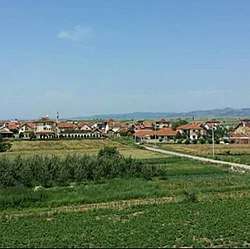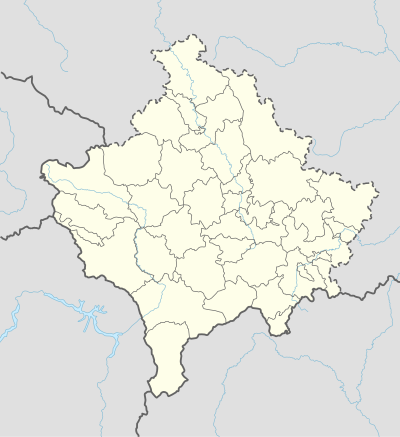Llugaxhi
Llugaxhi (in Albanian, pronounced [l-oog-aji]) or Lugadžija (Serbian Cyrillic: Лугаџија) is a village in Kosovo, located south of Lipjan.
Llugagji Lugadžija | |
|---|---|
Village | |
 View from south side of the village | |
 Llugagji Location in Kosovo | |
| Coordinates: | |
| Location | |
| District | Pristina |
| Municipality | Lipjan |
| Population (2011)[1] | |
| • Total | 1,157 |
| Time zone | UTC+1 (CET) |
| • Summer (DST) | UTC+2 (CEST) |
The village was founded by the Reçica family who fled the invasion of Niš (Albanian: Nish) during 1878. Many families now inhabit Llugaxhi, such as the Ratkoceri, Reçica, the Magashi, the Byqmeti, the Islami (subfamily of Reçica), the Tmava and others. Most roads in Llugaxhi are named after family ancestors, such as Sefë Reçica.
Llugaxhi is a medium-sized village, around 3.3678 squared in size (source from 2010), most of it being land for cropping and only a small amount of land is slightly urbanised. The oldest building is the mosque which is said to be around 100 years old,[2] but there are plans for a new mosque in the north of the village.[3]. There is an ever growing population which is partially due to people moving back from diaspora and the influx of new businesses from local owners.
Notes
- Kosovo is the subject of a territorial dispute between the Republic of Kosovo and the Republic of Serbia. The Republic of Kosovo unilaterally declared independence on 17 February 2008, but Serbia continues to claim it as part of its own sovereign territory. The two governments began to normalise relations in 2013, as part of the 2013 Brussels Agreement. Kosovo is currently recognized as an independent state by 97 out of the 193 United Nations member states. In total, 112 UN member states recognized Kosovo at some point, of which 15 later withdrew their recognition.